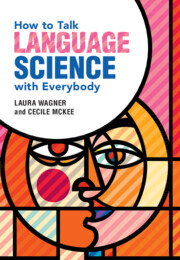Book contents
- How to Talk Language Science with Everybody
- How to Talk Language Science with Everybody
- Copyright page
- Contents
- Figures
- Preface
- Acknowledgments
- 1 Why Bother?
- 2 You Can Be the Expert
- 3 Cooperative Conversations
- 4 Conversational Goals
- 5 Know Your Audience
- 6 Creating Relevance by Generating Interest
- 7 Creating Relevance by Making Connections
- 8 Quality and Credibility
- 9 Quality vs Quantity
- 10 Learn to Listen
- 11 Information Structure
- 12 The Curse of Knowledge
- 13 Start with Examples
- 14 What’s New?
- 15 From Given to New
- 16 The Three-Legged Stool Approach
- 17 Working with a Range of Different Audiences
- 18 Where Can I Go?
- 19 Being a Good Partner
- 20 Finale
- Appendix Teaching with This Book
- References
- Index
9 - Quality vs Quantity
Incomplete ≠ Incorrect
Published online by Cambridge University Press: 17 May 2023
- How to Talk Language Science with Everybody
- How to Talk Language Science with Everybody
- Copyright page
- Contents
- Figures
- Preface
- Acknowledgments
- 1 Why Bother?
- 2 You Can Be the Expert
- 3 Cooperative Conversations
- 4 Conversational Goals
- 5 Know Your Audience
- 6 Creating Relevance by Generating Interest
- 7 Creating Relevance by Making Connections
- 8 Quality and Credibility
- 9 Quality vs Quantity
- 10 Learn to Listen
- 11 Information Structure
- 12 The Curse of Knowledge
- 13 Start with Examples
- 14 What’s New?
- 15 From Given to New
- 16 The Three-Legged Stool Approach
- 17 Working with a Range of Different Audiences
- 18 Where Can I Go?
- 19 Being a Good Partner
- 20 Finale
- Appendix Teaching with This Book
- References
- Index
Summary
Chapter 9 opens with an overly detailed recipe for lentil soup that readers remove steps from. Many people new to public engagement express concern about "dumbing down" their science, for example by leaving out critical nuance. The chapter discusses examples like the recipe exercise, in which some details are omitted without compromising truth. In these examples, fewer details effectively enhance clarity. Three suggestions for balancing the Maxim of Quality (tell the truth) with the Maxim of Quantity (say as much as you need but not more) are: to distinguish phenomena from explanations, to distinguish classics from hot news, and to emphasize process. Readers are encouraged to take the long view, thinking of every science conversation as contributing a little to someone’s learning. If nothing else, a demonstration that generates people’s interest and excitement is likely to inspire them to learn more later. This chapter’s Closing Worksheet asks readers to go through the explanations in their demonstrations and to keep cutting out 10 percent until they are left with a reasonable description of the phenomenon and a one-sentence take-home message.
- Type
- Chapter
- Information
- How to Talk Language Science with Everybody , pp. 101 - 115Publisher: Cambridge University PressPrint publication year: 2023

